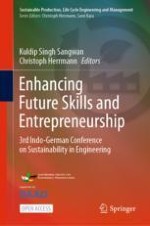
Open Access 2020 | OriginalPaper | Buchkapitel
23. Role of Self-efficacy in the Learning Output of Engineering Education
verfasst von : Abhijith Venugopal, Rajni Singh, Devika
Erschienen in: Enhancing Future Skills and Entrepreneurship
Aktivieren Sie unsere intelligente Suche, um passende Fachinhalte oder Patente zu finden.
Wählen Sie Textabschnitte aus um mit Künstlicher Intelligenz passenden Patente zu finden. powered by
Markieren Sie Textabschnitte, um KI-gestützt weitere passende Inhalte zu finden. powered by